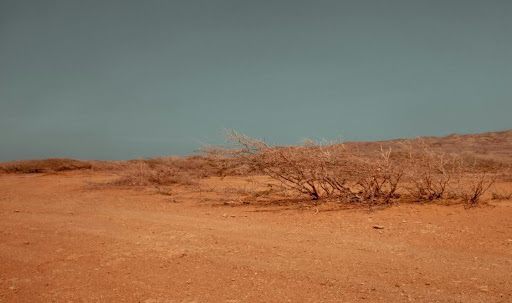Desertification and land degradation come with a massive economic toll, estimated at up to $15 trillion, and humanity is losing 100 million hectares annually. The UN projects that the vast majority of the world’s…

Desertification and land degradation come with a massive economic toll, estimated at up to $15 trillion, and humanity is losing 100 million hectares annually. The UN projects that the vast majority of the world’s arable land will be completely depleted within 45 to 60 years. With one-third of the Earth’s land being desert, it’s crucial to devise strategies and technologies to rehabilitate regions impacted by human-driven desertification.
In a world facing escalating challenges of soil degradation, desertification, and food security, Triunity Green emerges as a beacon of hope with its revolutionary approach to sustainable agriculture and land management. By harnessing the power of cutting-edge nanotechnology, their innovative methods not only address critical environmental issues but also offer significant opportunities for profitability in the agricultural sector. Triunity Green is revolutionizing the way people think about desert agriculture, offering a sustainable and economically viable solution to the pressing challenges of soil loss, water scarcity, and food security.
Harnessing Nanotechnology to Overcome Desert Challenges
Deserts, with their arid conditions and poor soil quality, have long been considered largely inhospitable to agriculture. However, Triunity Green’s innovative Nano Ionic Biomimetic Matrix is challenging this status quo. Engineered at the nanoscale, this advanced material encapsulates a bespoke powder matrix rich in micronutrients and bioactive agents essential for plant morphogenesis, enabling optimal plant growth even in the harshest desert environments.
“By addressing the inherent challenges of water retention, nutrient availability, and plant growth in sand environments, we are unlocking the agricultural potential of deserts, creating the opportunity for profitable ventures that contribute to global food security and economic development.” explains a spokesperson for Triunity Green.

Sustainable and Profitable Agriculture in Desert Landscapes
Triunity Green’s innovative approach to desert agriculture aims to create thriving ecosystems capable of producing abundant and nutritious food. By optimizing water management and nutrient delivery through their Nano Ionic Biomimetic Matrix, Triunity Green can achieve substantial resource conservation, reducing water consumption, fertilizer usage, and energy expenditure by up to 70%. “Desert agriculture has the potential to be both sustainable and profitable,” says the spokesperson. “This innovative technology not only makes it possible to grow crops in desert environments but also offers significant economic benefits, stimulating investment, job creation, and economic growth in regions previously considered unsuitable for agriculture.”
A Paradigm Shift in Sustainable Agriculture
By pioneering advancements at the nexus of nanotechnology and plant science, Triunity Green is heralding a new epoch in agriculture. Their interdisciplinary innovation ensures biomechanically superior anchorage and nuanced control over hydric and nutritional dynamics, transforming ordinary sand into a rich and sustainable soil-like analogue.
Triunity Green represents a groundbreaking advancement in the field of sustainable agriculture. “Our methods not only revolutionize the landscape of sand-mediated phytotechnologies but also pave the way for unparalleled precision in both sustainable and restorative agriculture. This marks a significant paradigm shift in the symbiotic relationship between plants and engineered substrates, setting new standards for profitability and environmental stewardship,“ says the spokesperson in Triunity Green.
Empowering Communities Through Sustainable Development
In addition to transforming deserts into profitable agricultural ventures, Triunity Green is committed to empowering local communities through sustainable development and education. By partnering with local governments, organizations, and farmers, Triunity Green fosters community engagement and capacity building, equipping people with the knowledge and resources they need to participate in and benefit from sustainable agricultural practices.

“Community engagement is at the heart of our mission,” emphasizes the spokesperson. “By empowering local communities to participate in sustainable desert agriculture, we are creating opportunities for economic growth, social development, and environmental stewardship, fostering a brighter and more prosperous future for all.”
Investing in a Sustainable Future
As the global community grapples with the urgent need to protect and restore the natural environment, the adoption of profitable and sustainable methods becomes increasingly crucial. By accelerating the transition to innovative solutions that prioritize both environmental sustainability and profitability, it can ensure a brighter and more prosperous future for all.
“As stewards of our planet, we must recognize that our existence is intricately linked to the health and vitality of our soil and environment,” emphasizes the spokesperson. “By leveraging biomimicry and investing in advanced scientific technologies, we can elucidate the intricacies of natural ecosystems and develop innovative solutions that foster a synergistic, profitable, and sustainable coexistence between humanity and the environment.”
Triunity Green is committed to creating a sustainable future by developing innovative technologies and practices that restore and regenerate the natural environment and urban landscapes. With a focus on creating regenerative, resilient, and profitable agricultural and urban land management systems, Triunity Green aims to address the pressing challenges of soil degradation, desertification, urbanization, and food security through the application of cutting-edge nanotechnology and plant science.

